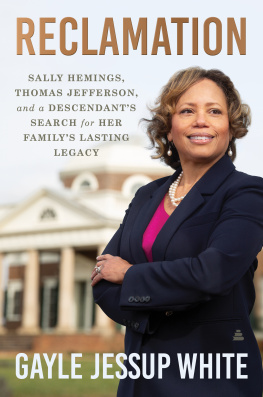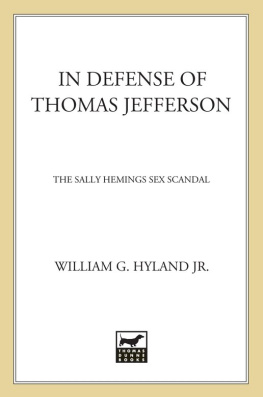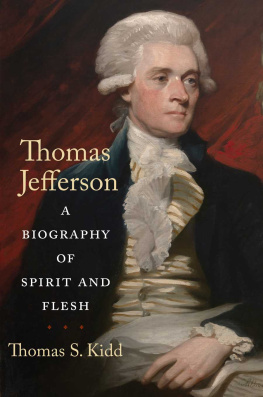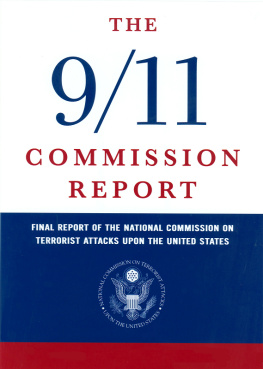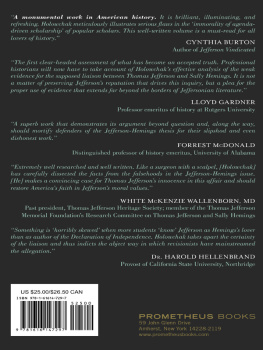The Jefferson-Hemings
Controversy
Report of the Scholars Commission
Edited by
Robert F. Turner
C AROLINA A CADEMIC P RESS
Durham, North Carolina
Copyright 2001, 2011
Robert F. Turner
All Rights Reserved
Library of Congress Cataloging-in-Publication Data
Scholars Commission on the Jefferson-Hemings Matter.
The Jefferson-Hemings controversy : report of the Scholars Commission / edited by Robert F. Turner.
p. cm.
ISBN 978-0-89089-085-1 (alk. paper)
1. Jefferson, Thomas, 17431826--Relations with women. 2. Hemings, Sally. 3. Jefferson, Thomas, 17431826--Relations with slaves. 4. Jefferson, Thomas, 17431826--Family. I. Turner, Robert F. II. Title.
E332.2.S35 2010
973.4'6092--dc22 2010031551
Carolina Academic Press
700 Kent Street
Durham, NC 27701
Telephone (919) 489-7486
Fax (919) 493-5668
www.cap-press.com
Printed in the United States of America
This book is dedicated to the memory of our beloved colleagues
Professor Lance Banning
Hallam Professor of History
University of Kentucky
(January 24, 1942January 31, 2006)
and
Professor Alf J. Mapp, Jr.
Eminent Scholar, Emeritus and Louis I. Jaffe Professor of History, Emeritus
Old Dominion University
(February 17, 1925January 23, 2011)
Table of Contents
Individual Views of Professor Robert F. Turner joined by
Professor Alf J. Mapp, Jr., Professor David N. Mayer,
Professor Forrest McDonald, and Professor Thomas Traut
Preface
For more than two centuries there have been rumors and allegations that Thomas Jefferson had a long-term sexual relationship with an enslaved woman named Sally Hemings. They originated from the pen of a disreputable journalist named James Thomson Callender in October 1802 and were picked up by Federalist editors and abolitionists in the United States and abroad. Most serious Jefferson scholars and many of Jeffersons political enemies dismissed them, in part because the notorious Callender lacked credibility and in part because the charge seemed so out of character for Jefferson. But the story resurfaced with the 1974 publication of Fawn Brodies Thomas Jefferson: An Intimate Biography and became more believable in the 1997 book by Annette Gordon-Reed, Thomas Jefferson and Sally Hemings .
Perhaps the most decisive development in the case was the publication in the prestigious British science journal Nature in November 1998 of results of a DNA study linking Sally Hemings youngest son to a Jefferson father. In January 2000 the Thomas Jefferson Memorial Foundationowner of Jeffersons home at Monticello and long a protector of the former presidents reputationissued its own report concluding that President Jefferson fathered at least one and perhaps all of Sally Hemings children.
Still, not everyone was convinced, and a group of doubters came together and established the Thomas Jefferson Heritage Society. Their first act was to seek a blue-ribbon reexamination of all of the evidence for and against Thomas Jeffersons paternity of one or more of Sally Hemings children. They approached a diverse group of senior scholars with a simple request: carefully examine all of the evidence, draw your own conclusions, and issue a public report. The Heritage Society played no role in the actual investigation, and no member of the Scholars Commission was compensated in any way for his or her efforts in this process. This volume is the final product of that Scholars Commission inquiry.
After a year-long investigation involving individual research and group meetings in a hotel near Dulles Airport outside of Washington, D.C., summary majority and minority reports were drafted and approved by group members. In addition, members of the Commission were invited to express their personal views with individual statements concurring or dissenting from the majority report. In the pages that follow, the official Majority Reportadhered to by twelve of the thirteen members of the Commissionappears first, followed by the Minority Report. It should be emphasized that the statements of individual views that follow the official summary report are attributable only to the members whose names appear at the front of each such statement.
In an effort to provide some historical context to the reception given the report and relevant subsequent developments, the editor has attached a Postscript at the end of the volume. The views expressed therein are his alone, and the Postscript is not a part of the official Report of the Scholars Commission. Members of the Scholars Commission are listed with their academic institutions for purposes of identification only, and the views expressed herein are those of the individuals involved and should not be attributed to any university, organization, or other entity.
Copies of the majority and minority reports and supplemental statements of individual views were distributed at the National Press Club in Washington, D.C., on April 12, 2001. Members were then given additional time to expand and revise their individual statements, with the expectation that a book version of the Scholars Commission Report would appear the following year. Regrettably, publication was delayed because the professional duties of the chairman of the commission and editor of this volume involved the study of international terrorism and other aspects of national security law. As might be imagined, the demands on his time following the September 11, 2001, terrorist attacks left little time for extracurricular endeavors.
We are pleased finally to make this volume available. It does not pretend to be the final answer to the controversy, but we hope it will be useful in assisting interested readers to understand the relevant facts and issues and to identify points of disagreement between experts.
Robert F. Turner
Charlottesville, Virginia
February 14, 2011
Acknowledgments
Being asked to chair the Scholars Commission (SC), and to work with such a distinguished group of scholars, was among my most memorable and cherished professional activities. I want to thank the Thomas Jefferson Heritage Society (TJHS) and its members for giving me this opportunity, and all of my distinguished colleagues on the SC for their outstanding work in our shared search for the truth. I also owe each of them my profound apology for the long delay in finally getting this volume in print.
Sadly, because of my delay in getting the final manuscript ready for publication, two of the most active and distinguished members of the Scholars Commission passed away before the book was published. Professors Lance Banning and Alf Mapp attended all of our meetings and took an active part in bringing this work to fruition. Both were extraordinary human beings and superb Jefferson scholars. We have dedicated this volume to them, but I wanted to add a personal note to emphasize my own deep indebtedness to both of them. I like to think that although they are no longer among us, their contributions will live on for years to come through their writings and the work of their students. May they rest in peace with the knowledge that the world was a better place for their presence here.
I would be remiss if I did not thank several individuals who contributed to bringing this volume to fruition. Marilyn Yurk provided the guidance of a professional editor, as did Becky Gildersleeve. Carolyn Andersen provided valuable research assistance at a critical time.
I am also most grateful to Dr. Keith Sipe, Linda Lacy, Tim Colton, and their colleagues at Carolina Academic Presswho provided encouragement and a variety of other assistance in transforming the manuscript into a finished book. They patiently tolerated the numerous delays in the process caused by the post-9/11 increased demands on my time. I have worked with them on several other volumes over more than two decades, and they have never failed to exceed all reasonable expectations.


